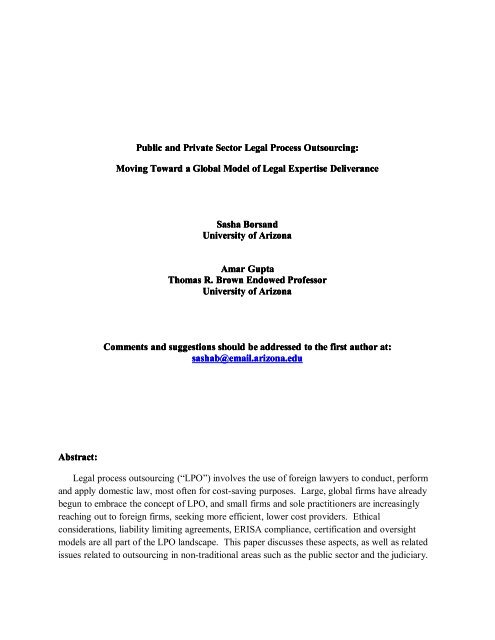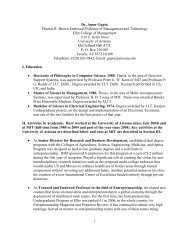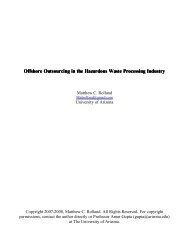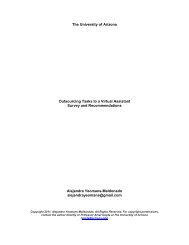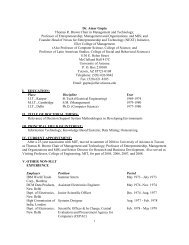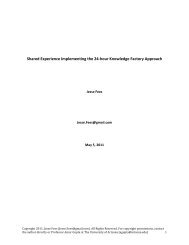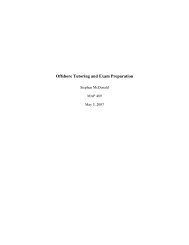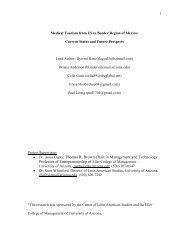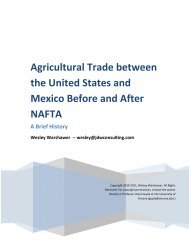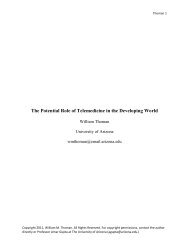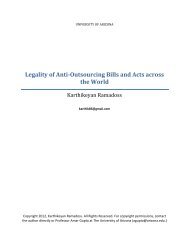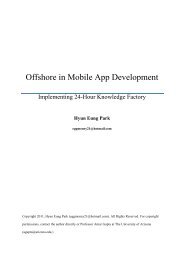Public and Private Sector Legal Process Outsourcing - University of ...
Public and Private Sector Legal Process Outsourcing - University of ...
Public and Private Sector Legal Process Outsourcing - University of ...
Create successful ePaper yourself
Turn your PDF publications into a flip-book with our unique Google optimized e-Paper software.
Abstract: Abstract: Abstract:<br />
<strong>Public</strong> <strong>and</strong> <strong>Private</strong> <strong>Sector</strong> <strong>Legal</strong> <strong>Legal</strong> <strong>Legal</strong> <strong>Process</strong> <strong>Outsourcing</strong>:<br />
Moving Toward a Global Global Global Model <strong>of</strong> <strong>Legal</strong> Expertise Deliverance<br />
Sasha Bors<strong>and</strong><br />
<strong>University</strong> <strong>of</strong> Arizona<br />
Amar Gupta<br />
Thomas Thomas Thomas R. Brown Endowed Pr<strong>of</strong>essor Pr<strong>of</strong>essor Pr<strong>of</strong>essor<br />
<strong>University</strong> <strong>University</strong> <strong>University</strong> <strong>of</strong> Arizona<br />
Comments <strong>and</strong> suggestions should be addressed addressed addressed to the the the first author at:<br />
sashab@email.arizona.edu<br />
sashab@email.arizona.edu<br />
sashab@email.arizona.edu<br />
<strong>Legal</strong> process outsourcing (“LPO”) involves the use <strong>of</strong> foreign lawyers to conduct, perform<br />
<strong>and</strong> apply domestic law, most <strong>of</strong>ten for cost-saving purposes. Large, global firms have already<br />
begun to embrace the concept <strong>of</strong> LPO, <strong>and</strong> small firms <strong>and</strong> sole practitioners are increasingly<br />
reaching out to foreign firms, seeking more efficient, lower cost providers. Ethical<br />
considerations, liability limiting agreements, ERISA compliance, certification <strong>and</strong> oversight<br />
models are all part <strong>of</strong> the LPO l<strong>and</strong>scape. This paper discusses these aspects, as well as related<br />
issues related to outsourcing in non-traditional areas such as the public sector <strong>and</strong> the judiciary.
I. <strong>Outsourcing</strong> <strong>of</strong> the <strong>Legal</strong> Pr<strong>of</strong>ession<br />
In the words <strong>of</strong> Thomas Friedman 1 , outsourcing is flattening the world as we know it. 2<br />
As the world becomes “flatter,” the playing field levels, forcing businesses to compete both<br />
nationally <strong>and</strong> internationally. <strong>Outsourcing</strong> 3 is just one <strong>of</strong> the many ways in which business<br />
organizations are attempting to better situate themselves in the global market. Even pr<strong>of</strong>essions<br />
such as medicine which were thought to require face to face interaction between the doctor <strong>and</strong><br />
the patient can now be practiced remotely with the help <strong>of</strong> evolving technologies. 4 Technology<br />
facilitates the division <strong>and</strong> distribution <strong>of</strong> tasks to those able to most efficiently accomplish them,<br />
regardless <strong>of</strong> their location.<br />
The legal pr<strong>of</strong>ession has also benefitted from the advent <strong>of</strong> new technologies, enabling<br />
attorneys throughout the globe to work together for mutual advantage. However, some<br />
1 Thomas Friedman. The World is Flat: A Brief History <strong>of</strong> the Twenty-First Century. (2005).<br />
2 According to Friedman, apart from outsourcing, there are nine other major "flatteners" leveling<br />
the global playing field: 1) The collapse <strong>of</strong> Berlin Wall leading to the end <strong>of</strong> the Cold War <strong>and</strong><br />
allowing previously excluded parties into the economic mainstream, 2) Netscape’s increasing<br />
internet availability to all <strong>and</strong> accompanying media digitization, 3) Networking s<strong>of</strong>tware<br />
allowing computers to communicate with each other without the need for human interface, 4)<br />
Open source communities, such as Wikipedia, that allow for public comment, 5) Offshoring,<br />
outsourcing outside one’s home country, 6) Increases in supply chain management <strong>and</strong><br />
technology, 7) Insourcing, where a company brings activities that were, 8) In-forming, an aspect<br />
<strong>of</strong> the internet, that allows information to be readily accessed <strong>and</strong> transmitted by virtually<br />
anyone, <strong>and</strong> 9) Personal digital devices such as ipods, cellular telephones <strong>and</strong> PDAs that allow<br />
people to access information, computers, <strong>and</strong> other people from remote locations. Id.<br />
3 <strong>Outsourcing</strong> is arranging for work to be done by someone else, based on reasons <strong>of</strong> cost,<br />
competence, or convenience. In this paper, the authors are most <strong>of</strong>ten referring to <strong>of</strong>fshore<br />
outsourcing which involves outsourcing activities to foreign countries; however, many <strong>of</strong> the<br />
ideas expressed here can also be applied to domestic outsourcing, otherwise known as<br />
homesourcing, farmsourcing, or onshoring.<br />
4 See Michael Cross. “Face to face with the future <strong>of</strong> remote medical consultations.” The<br />
Guardian. February 7, 2008. See also Thomas R. McLean. “Symposium: Shaping a New<br />
Direction for Law <strong>and</strong> Medicine: An International Debate on Culture, Disaster, Biotechnology<br />
<strong>and</strong> <strong>Public</strong> Health. Article: Telemedicine <strong>and</strong> the commoditization <strong>of</strong> medical services. DePaul<br />
Journal <strong>of</strong> Health Care Law. 10 DePaul J. Health Care L. 131. Symposium 2007.<br />
2
American companies are reluctant to have their legal work performed by a company that is not<br />
located in the United States, because <strong>of</strong> possible negative press <strong>and</strong> correlative public backlash. 5<br />
Nonetheless, many corporations are setting up captive centers, or locating part <strong>of</strong> their<br />
organizations’ legal department to locations such as India where labor cost is <strong>of</strong>ten 15- 20% <strong>of</strong><br />
what their U.S. counterparts charge. 6 This is known as legal process outsourcing (“LPO”).<br />
While global law firms, those already engaged in multinational activities, have been<br />
engaging in LPO since around 2001, small firms <strong>and</strong> sole practitioners have largely ignored this<br />
trend. Indeed, many domestic firms have only recently considered outsourcing their back <strong>of</strong>fice<br />
activities, let alone their legal activities. This paper describes emerging trends in the LPO arena,<br />
along with the associated legal, regulatory, <strong>and</strong> pr<strong>of</strong>essional issues..<br />
II. II. II. Historic Perspective <strong>and</strong> Current Current Current Examples<br />
<strong>Outsourcing</strong> <strong>of</strong> legal services is a relatively new concept. According to Anita Jain, the<br />
first U.S corporation to outsource legal services was GE Plastics in 2001. 7 GE Plastics had its<br />
U.S. staff interview <strong>and</strong> supervise the new <strong>of</strong>fshore employees who were located in Gurgaon,<br />
India. These employees were mainly drafting outsourcing agreements <strong>and</strong> confidentially<br />
contracts. Over a two-year period, GE reported saving “nearly $2 million in legal fees that<br />
otherwise would have gone to outside counsel.” 8 In 2006, Nasscom published a report predicting<br />
the rapid increase <strong>of</strong> worldwide LPO, estimating the market potential for legal services<br />
5 Jain, Anita. “The Emerging Indian <strong>Legal</strong> Offshoring Opportunity” The Financial Times. April<br />
17, 2006.<br />
6 Flahardy; Rowthorn.<br />
7 It should be noted that Rahul Jindal, a prominent LPO blogger, places the first instance <strong>of</strong><br />
legal work being outsourced to India to have occurred in 1995. See Arin Greenwood.<br />
“Manhattan Work at Mumbai Prices: Inside India’s hottest legal outsourcing firm.” ABA Journal.<br />
American Bar Association. October, 2007.<br />
8 Flahardy, Cathleen “Overhyped, Underused, Overrated: The Truth about <strong>Legal</strong> Offshoring”,<br />
Corporate <strong>Legal</strong> Times. July 2005.<br />
3
outsourceable from the US to be approximately $3-4 billion. 9 At the time <strong>of</strong> the release <strong>of</strong> this<br />
report, Nasscom estimated that only two to three per cent <strong>of</strong> this market had been tapped ($60-80<br />
million). 10<br />
Although the majority <strong>of</strong> work to date has been low-level tasks such as transcriptions,<br />
document conversions <strong>and</strong> legal data entry, there is a gradual shift towards higher value<br />
services. 11 In 2006, an Indian law firm specializing in patent law, Pangea3, received $4 million<br />
from private equity firms. 12 This funding illustrates why some industry analysts believe that the<br />
LPO market will increase, rapidly reaching 11.5 billion by 2010. 13<br />
Another current example <strong>of</strong> LPO is the Dallas-based law firm <strong>of</strong> Bickel & Brewer. 14 The<br />
first U.S. law firm to open an <strong>of</strong>fice overseas, Bickel & Brewer established an <strong>of</strong>fice in<br />
Hyderabad, India. 15 The project’s founders explained that this was initially a solution to<br />
“h<strong>and</strong>ling the millions <strong>of</strong> pieces <strong>of</strong> information that confront [them] in each case.” 16 This <strong>of</strong>fice<br />
has since spun <strong>of</strong>f to become a separate entity, Imaging & Abstract International, which h<strong>and</strong>les<br />
work for several additional U.S. clients. 17<br />
9 Deccan Herald. “LPO, To Create The Next Large Employment Wave.” Nasscom.<br />
http://www.nasscom.in/Nasscom/templates/NormalPage.aspx?id=44596<br />
10 Abhinav Ramnarayan. “Go slow' in order.” The Hindu Business Line. February 6, 2006.<br />
http://www.thehindubusinessline.com/bline/ew/2006/02/06/stories/2006020600020100.htm<br />
11 S<strong>and</strong>burg, Brenda. “India Inked: Local law firms <strong>and</strong> their clients save money with<br />
Indian patent shops.” The Recorder. January 14, 2005.<br />
12 Kannan, Shanthi “<strong>Legal</strong> outsourcing firm gets funding.” The Hindu Business Line. Aug 05,<br />
2006<br />
13 Jain supra.<br />
14 “Not Your Father’s Law Firm.” New York Magazine. December 17, 2007.<br />
15 “Litigation Support Services.” Bickel & Brewer. http://www.bickelbrewer.com/72.html<br />
16 Devi, Laxmi “Indian legal eagles wing their way to BPOs.” The Economic Times. June 9,<br />
2005.<br />
17 Id.<br />
4
DuPont is another example <strong>of</strong> a large U.S. corporation that has entered into LPO<br />
arrangements. DuPont has hired lawyers in the Philippines to work 24 hours a day (in three, 8<br />
hour shifts), seven days a week. 18 These lawyers conduct first-level document review for<br />
upcoming cases. This includes preparing documents <strong>and</strong> coding potential evidence for such cases.<br />
Underst<strong>and</strong>ably, the benefits <strong>of</strong> sending work abroad to such <strong>of</strong>fices—such as saving time <strong>and</strong><br />
money—increases with increases in the amount <strong>of</strong> data that needs to be researched <strong>and</strong> reviewed<br />
in a case. DuPont is hoping to cut down the time involved in processing from 18 months to 3<br />
months <strong>and</strong> to achieve a savings <strong>of</strong> 40-60%, or $6 million, <strong>of</strong> their annual budget for these tasks.<br />
Rhodia, a Paris-based producer <strong>of</strong> specialty chemicals, signed a six-year contract with<br />
Accenture to outsource a majority <strong>of</strong> its legal <strong>and</strong> accounting work to Prague, Czech Republic in<br />
order to keep up with increasing work. 19 Accenture initiated the st<strong>and</strong>ardization process by<br />
moving 15 existing systems <strong>of</strong> Rhodia to Prague. In less than two years, the concept <strong>of</strong> a shared<br />
service center led to a cost reduction <strong>of</strong> over 35%. 20<br />
More recently, production houses like 20th Century Fox, Sony Pictures <strong>and</strong> Universal<br />
Studios are working with SDD Global Solutions, headquartered in India, who will support the<br />
legal requirements <strong>of</strong> their movie releases. SDD Global, a LPO firm with 40 attorneys, is already<br />
preparing arguments <strong>and</strong> counter-arguments to support some <strong>of</strong> the most complex legal issues in<br />
Hollywood. The company has signed to work on three global movie releases <strong>and</strong> will be<br />
h<strong>and</strong>ling their pre-<strong>and</strong> post-production legal issues. 21 Additionally, the widespread financial<br />
downturn may lead previously disinterested firms to look toward LPO. Attempting to “do more<br />
18 Engardio, 2006, p. 42.<br />
19 Stein, 2003.<br />
20 Cooper, 2003.<br />
21 “Hollywood comes to Mysore.” Nasscom BPO Newsline. Issue No. 73. November 2007.<br />
http://www.nasscom.in/Nasscom/templates/NormalPage.aspx?id=53090<br />
5
with less,” firms providing Chapter 11 bankruptcy reorganization services are likely to look<br />
towards LPO to enable them to h<strong>and</strong>le the “deluge” that many are predicting. 22<br />
A. A. A. LPO Host Countries Countries Countries<br />
Although India is the biggest <strong>and</strong> most common country to receive legal outsourced work,<br />
other countries like the Philippines, Australia, China, <strong>and</strong> South Korea are also in the market <strong>of</strong><br />
<strong>of</strong>fshore LPO. As India’s costs have risen 15% within the past few years, other Asian LPO<br />
locations have gained in popularity. In particular, the Philippines have become an attractive<br />
alternative for U.S. <strong>and</strong> British firms for a variety <strong>of</strong> reasons. The Philippines have high marks<br />
for its large, educated talent pool <strong>and</strong> English language skills. The Philippines is an appealing<br />
location because historically, the Philippines was an American colony, contributing to cultural<br />
resemblance <strong>and</strong> a legal system based on U.S. law. 23 Conversely, the Philippines lacks<br />
infrastructure compared to other locations. Other locations, such as Australia <strong>and</strong> South Africa,<br />
are similarly attractive because <strong>of</strong> their history as British colonies <strong>and</strong> hence, British, common-<br />
law legal system. 24<br />
B. Virtual firms <strong>and</strong> the small practitioner<br />
Large U.S. international firms take advantage <strong>of</strong> LPO because they “have the critical<br />
mass to justify the time <strong>and</strong> expense <strong>of</strong> everything necessary--from selecting <strong>and</strong> developing<br />
relationships with outsourcing companies, deciding what work will be outsourced, setting up<br />
22 Stephen D. Kong. “Preparing For The Bankruptcy ‘Wave’: Using <strong>Legal</strong> <strong>Process</strong> <strong>Outsourcing</strong><br />
Before, During And After Chapter 11.” Metropolitan Corporate Counsel. Northeast Edition. June<br />
2008. Pg. 20 Vol. 16, No. 6.<br />
23 Rudyard III Avila. “<strong>Legal</strong> <strong>Process</strong> <strong>Outsourcing</strong> in the Philippines: The <strong>Legal</strong> Culture.”<br />
http://lpophil.blogspot.com/<br />
24 George Beveridge. “South Africa: The next legal outsourcing hub?” Asia <strong>Legal</strong> Business<br />
News. January 21, 2009. http://asia.legalbusinessonline.com/news/breakingnews/32154/details.aspx<br />
6
systems <strong>and</strong> procedures to coordinate the work-flow processes, <strong>and</strong> setting up the technical<br />
infrastructure (both at home <strong>and</strong> abroad) to support the flow <strong>of</strong> information <strong>and</strong> documents”. 25<br />
However, small to medium-sized firms have yet to enter the LPO market in force.<br />
An exception to the general hesitancy on the part <strong>of</strong> sole, small <strong>and</strong> medium-sized legal<br />
practitioners to enter into LPO relationships has been the virtual firm. Virtual law firms first<br />
came into the modern lexicon in the mid-1990s. 26 With no physical <strong>of</strong>fices, virtual firms<br />
interface with clients almost entirely via the internet <strong>and</strong> other electronic methods <strong>of</strong><br />
communication such as email <strong>and</strong> teleconference. For example, the Rimon Law Group set up a<br />
virtual firm so that its clients can access lower-priced attorneys in Israel. 27 Rimon describes its<br />
LPO virtual firm process as follows:<br />
When a potential client first contacts Rimon, the client speaks with<br />
a managing attorney in Rimon’s San Francisco headquarters. The<br />
managing attorney provides a free initial consultation to evaluate<br />
the client's legal needs <strong>and</strong> helps the client decide which<br />
specializing attorney or team <strong>of</strong> attorneys best suits those needs.<br />
From then on, Rimon's clients deal directly with their specializing<br />
attorneys, which fosters the development <strong>of</strong> a strong <strong>and</strong><br />
personalized attorney-client relationship. Throughout this process,<br />
the client can continue to approach the managing attorney in San<br />
Francisco with questions or for assistance. 28<br />
25 K. William Gibson. “<strong>Outsourcing</strong> Spotlight: <strong>Outsourcing</strong> <strong>Legal</strong> Services Abroad: A Trend<br />
Grows into a Phenomenon (Like it or not). ABA, Law Practice. 34:5. July 2008. 47.<br />
26 Jill S. Chanen. “The Virtual Law Firm: Lawyer Practices on the Internet.” A.B.A. J., July<br />
1995.<br />
27 Rahul Jindal. “Press Release: Rimon Law Group Introduces Virtual Law Firm <strong>of</strong> Americans<br />
in Israel”. <strong>Legal</strong> <strong>Process</strong> <strong>Outsourcing</strong> Blog. July 09, 2008.<br />
http://legallyours.blogspot.com/2008/07/press-release-rimon-law-group.html<br />
28 Id.<br />
7
This is just one particular operational structure, but since what makes virtual firms attractive is<br />
their flexibility; any structure that improves efficiency <strong>and</strong> lowers overhead expenses could be<br />
utilized.<br />
According to a 2005 article in the Delaware Lawyer, “the virtual firm structure is critical<br />
for law firms to adopt in order to succeed in the years ahead.” 29 While virtual firms may have<br />
become more common, traditional firms have held on to their physical <strong>of</strong>fices for a variety <strong>of</strong><br />
reasons. First, a client’s perception <strong>of</strong> a firm may be influenced by the firm’s physical<br />
manifestation – its <strong>of</strong>fice <strong>and</strong> its staff. Clients may prefer face-to-face interaction <strong>and</strong> attorneys<br />
may prefer having a physical <strong>of</strong>fice, away from the home, in which to conduct business.<br />
Additionally, attorneys <strong>of</strong>ten work collaboratively, discussing cases <strong>and</strong> issues with each other to<br />
come up with solutions to client problems. Whether any <strong>of</strong> these considerations will continue to<br />
outweigh the benefits <strong>of</strong> virtual firms remains to be seen, but as small firms embrace the idea <strong>of</strong><br />
relegating some <strong>of</strong> its operations to the electronic field, they will no doubt become more<br />
comfortable with LPO as well.<br />
C. C. C. Medical Experts<br />
A new, interesting area combining LPO services with technology advancements is that <strong>of</strong><br />
medical malpractice <strong>and</strong> personal injury litigation. 30 Perhaps more than in any other area <strong>of</strong> law,<br />
medical malpractice <strong>and</strong> personal injury require extensive medical research <strong>and</strong> hiring <strong>of</strong><br />
expensive experts to prove one’s case. Many cases necessitate multiple experts to testify in their<br />
respective areas <strong>of</strong> expertise. 31 For instance, in a case regarding an automobile accident, the<br />
29 John W. Anderson. “The Virtual Law Firm.” 23 Del. Law. 36, 37 (Winter 2005/2006).<br />
30 Rahul Jindal. “Indian doctors reach U.S. courts.”<br />
http://legallyours.blogspot.com/2007/10/indian-doctors-reach-us-courts.html<br />
31 See<br />
8
plaintiff may want an expert on human responses to impacts to testify to the expected types <strong>of</strong><br />
injuries that would be incurred in that sort <strong>of</strong> crash. Medical experts are needed to testify on the<br />
st<strong>and</strong>ards <strong>of</strong> care; there may be several <strong>of</strong> them depending upon the medical specialties <strong>of</strong><br />
treating physicians <strong>and</strong> the various facilities where the plaintiff was treated. Additionally, these<br />
cases are usually taken on contingent fee basis, with the lawyer being paid a portion <strong>of</strong> the<br />
amount <strong>of</strong> settlement at the conclusion <strong>of</strong> the litigation.<br />
Experts, medical <strong>and</strong> otherwise, <strong>of</strong>ten charge more per hour than the attorneys hiring<br />
them <strong>and</strong> thus can add considerable expense <strong>and</strong> even serve as a barrier to litigation. The hiring<br />
<strong>of</strong> doctors licensed outside <strong>of</strong> the U.S. can significantly decrease this cost. A company,<br />
MDinaBox, based out <strong>of</strong> Ocala, Florida provides medical experts located in India for personal<br />
injury <strong>and</strong> medical malpractice plaintiffs. 32 The uniqueness <strong>of</strong> MDinaBox is that “[i]t provides<br />
lawyers real-time access to medical doctors in India during deposition or trial while they cross-<br />
examine the opposing doctor.” 33<br />
III. III. III.<strong>Public</strong> <strong>Public</strong> <strong>Sector</strong> <strong>Legal</strong> <strong>Legal</strong> <strong>Legal</strong> <strong>Process</strong> <strong>Outsourcing</strong><br />
LPO is less prevalent in the public sector. Many municipalities have written <strong>and</strong><br />
unwritten policies that government contracts should favor local companies. If this is impractical,<br />
then in-state companies or alternatively U.S. corporations are used. 34 While such protectionist<br />
practices may not be legal as an impermissible hindrance to interstate commerce, these policies<br />
32 Naseem Sowti. “A global courtroom: Company uses doctors in India for cross-examination in<br />
U.S. courts.” The Star Banner. March 11, 2007.<br />
http://www.ocala.com/article/20070311/BUSINESS/203110332<br />
33 Id.<br />
34 Lee A. Patterson, III. “<strong>Outsourcing</strong> <strong>of</strong> <strong>Legal</strong> Service: A brief survey <strong>of</strong> the practice <strong>and</strong> the<br />
minimal impact <strong>of</strong> protectionist legislation.” Richmond Journal <strong>of</strong> Global Law <strong>and</strong> Business.<br />
Spring, 2008. 7:177, 181.<br />
9
are nonetheless put in place for a variety <strong>of</strong> public policy considerations. 35 For instance, any<br />
legal position outsourced -- at city level, county level, or in <strong>of</strong>fice <strong>of</strong> the attorney general --<br />
represents a job lost by a member <strong>of</strong> the voting public. On the other h<strong>and</strong>, the adoption <strong>of</strong> LPO<br />
practices leads to lower costs <strong>and</strong> the cost savings can be passed on to the taxpayer.<br />
A. A. A. <strong>Outsourcing</strong> in the the the Judiciary<br />
The high cost <strong>of</strong> our nation’s judiciary <strong>and</strong> the backlog that it can never seem to get out<br />
from under are just two <strong>of</strong> the reasons U. S. courts should look at the benefits <strong>of</strong> outsourcing.<br />
Courts have long outsourced non-core functions such as transcription services <strong>and</strong> processing <strong>of</strong><br />
traffic tickets. 36 37 Ingo Keilitz, past president <strong>of</strong> the National Center for State Courts <strong>and</strong> head<br />
<strong>of</strong> CourtMetrics, a private consulting firm, proposed the idea <strong>of</strong> outsourcing court performance<br />
measurement systems in his blog in 2006. 38 However, none <strong>of</strong> what has been proposed or<br />
outsourced to date constitutes higher-level legal tasks.<br />
Most judges’ chambers are relatively small operations. From top to bottom, they consist<br />
<strong>of</strong> the judge, his or her permanent clerk (usually one, but maybe two), administrative secretary,<br />
judicial externs (also known as temporary law clerks), <strong>and</strong> courtroom personnel. Courtroom<br />
personnel consist <strong>of</strong> a bailiff, a court reporter, <strong>and</strong> U.S. Marshalls in the federal courts. City<br />
judges, magistrates, <strong>and</strong> justices <strong>of</strong> the peace may operate with a much leaner staff.<br />
35 See Amar Gupta <strong>and</strong> Deth Sao. “Anti-Offshoring Legislation <strong>and</strong> United<br />
States Federalism.” Texas International Law Journal. Volume 44, Issue 4. April 2009.<br />
36 Rachanee Srisavasdi. “County supervisor opposes court outsourcing.” OC Register. July 27,<br />
2007. http://crime.freedomblogging.com/2007/07/27/county-supervisor-opposes-courtoutsourcing/256/<br />
37 See Kwasnik v. Leblon, 228 Fed. Appx. 238, 241 (3d Cir. N.J. 2007).<br />
38 Ingo Keilitz. “<strong>Outsourcing</strong> Court Performance Measurement” Made2Measure. March 13,<br />
2006. http://made2measure.blogspot.com/2006/03/outsourcing-court-performance.html<br />
10
<strong>Legal</strong> work begins with the judicial externs who review the case documents <strong>and</strong> condense<br />
<strong>and</strong> brief them for review by the law clerk. Judicial externs are typically unpaid law students.<br />
Because they must attend classes during the year, judicial externs are in limited supply except<br />
during the summer months. Additionally, they are not attorneys <strong>and</strong> must <strong>of</strong>ten spend many<br />
hours educating themselves as to various topics <strong>of</strong> law <strong>and</strong> procedure in order to begin projects<br />
on which they are working.<br />
The clerk’s primary responsibility is to read the motions presented to the court, brief the<br />
issues, look at the record, <strong>and</strong> present this information in a condensed format to the judge. Some<br />
judges also have the judicial externs write the first draft <strong>of</strong> the opinion that is reviewed by the<br />
permanent clerk <strong>and</strong> then by the judge. If a judge were able to hire additional judicial externs<br />
<strong>and</strong> clerks, this would greatly increase the speed with which a judge is able to respond to motions.<br />
One <strong>of</strong> the counter arguments to outsourcing judicial clerking work abroad is that this is<br />
an important training ground for law students to become successful lawyers or permanent clerks.<br />
LPO will not obviate a judge’s need for an in-chambers clerk. This is because there are many<br />
aspects <strong>of</strong> cases that must be dealt with in real time. For example, an evidentiary issue arises<br />
during trial, the concerned legal issue will need to be researched while the judge takes a recess to<br />
examine the issue. Having to package such a task <strong>and</strong> send it to someone located abroad would<br />
11
most likely take more time than the research effort itself. Instead, LPO <strong>of</strong> initial review <strong>of</strong><br />
motions made to the court should free the clerk <strong>and</strong> the judge up to examine the more difficult<br />
issues <strong>and</strong> cases, rather than trying to manage their dockets. Furthermore, the domestic clerk,<br />
upon whom the judge ultimately relies, will be tasked with reviewing the work <strong>of</strong> the LPO clerks.<br />
Thus, while LPO may result in their being fewer clerking positions within the court, it will not<br />
obviate their need completely. Additionally, following their first year <strong>of</strong> law school, many<br />
students take unpaid positions with the courts. These positions, as they cost nothing to the court<br />
<strong>and</strong> serve the public purpose <strong>of</strong> pr<strong>of</strong>essional edification, are unlikely to disappear.<br />
One <strong>of</strong> the counter arguments to outsourcing legal work abroad is that the sluggishness <strong>of</strong><br />
our nation’s judiciaries is a feature rather than a problem; it is a tool for lawyers <strong>and</strong> the litigants,<br />
as well as a valuable deterrent. Long wait times for judicial opinions give parties’ time to settle<br />
matters amongst themselves, rather than by court decree. Additionally, the knowledge <strong>of</strong> the<br />
length <strong>of</strong> the judicial process may deter frivolous suits. Of course, it may also deter valid suits<br />
that simply cannot afford the expense <strong>of</strong> protracted litigation.<br />
Although outsourcing <strong>of</strong> judicial functions may appear farfetched, at one time, the use <strong>of</strong><br />
electronic documents by the courts was also thought <strong>of</strong> as improbable. In the 1980s, optical disc<br />
technology made it possible to store large numbers <strong>of</strong> documents in electronic format on write-<br />
once discs. 39 IBM initially determined the technology to be unworkable for legal purposes<br />
because they believed the courts would always require original documents in the place <strong>of</strong><br />
electronic versions. Thus, attorneys <strong>and</strong> clients would always be required to maintain storage <strong>of</strong><br />
39 P. Asthana , B. I. Finkelstein , <strong>and</strong> A. A. Fennema “Rewritable optical disc technology.” IBM<br />
Journal <strong>of</strong> Research <strong>and</strong> Development. Volume 40, Number 5, 1996. See also “Optical Disc<br />
Technology: An A-Z on Laser Light Storage.” ExtremeTech.<br />
http://whitepapers.silicon.com/0,39024759,60022023p,00.htm<br />
12
original documents <strong>and</strong> the utility <strong>of</strong> optical disc storage would be greatly undermined. At that<br />
time (in the early eighties), one <strong>of</strong> the authors (<strong>of</strong> this paper) wrote a white paper describing how<br />
the “write-once” capability <strong>of</strong> the initial generation <strong>of</strong> optical devices would make these devices<br />
ideal for storing legal, educational, <strong>and</strong> medical records; the non-erasability feature was a major<br />
asset in terms <strong>of</strong> using these disks for archival use, especially in situations where later questions<br />
may arise on what transpired at what point in time.<br />
Today, electronic data is accepted <strong>and</strong> used by the courts for a wide variety <strong>of</strong> purposes.<br />
For example, the principal rules that regulate document retention <strong>and</strong> preservation for brokers,<br />
dealers, <strong>and</strong> self-regulatory organization members are Rules 240.17a-3 <strong>and</strong> 240.17a-4,<br />
promulgated by the Securities <strong>and</strong> Exchange Commission (“SEC”), pursuant to the Securities<br />
Exchange Act <strong>of</strong> 1934. 40 According to Rule 17a-4, which lays out preservation requirements for<br />
those records that must be produced by exchange members, brokers, <strong>and</strong> dealers pursuant to Rule<br />
17a-3 <strong>of</strong> the 1934 Act, electronic storage is assumed as the appropriate medium for electronic<br />
correspondence <strong>and</strong> other electronic data.<br />
IV. Concerns <strong>and</strong> Pitfalls <strong>of</strong> <strong>Outsourcing</strong> <strong>Legal</strong> <strong>Legal</strong> <strong>Legal</strong> Work Abroad<br />
According to the Institute for Global Challenges <strong>and</strong> the Law, common concerns <strong>of</strong> those<br />
considering outsourcing include ethical, liability, privacy <strong>and</strong> quality control issues. The issue <strong>of</strong><br />
whether or not it is lawful to have non-licensed foreigners engage in legal work has come before<br />
the San Diego <strong>and</strong> Los Angeles County Bar associations, among others. While the Bars have<br />
40 15 C.F.R. 240.17a-3, 240.17a-4. See also Jayant W. Tambe <strong>and</strong> Jonathan M. Redgrave.<br />
“Electronic Discovery Emerges As Key Corporate Compliance Issue .” The Metropolitan<br />
Corporate Counsel. October, 2002.<br />
13
consistently found that outsourcing legal work is permissible, as long as it is supervised by a<br />
licensed attorney, questions <strong>of</strong> quality have been met with mixed responses. 41<br />
A. A. A. Stability <strong>of</strong> Outsourced Nations Nations Nations<br />
Inherent in LPO practice is the concern over the political <strong>and</strong> economic stability <strong>of</strong> the<br />
host country. There is some degree <strong>of</strong> correlation between a nation’s level is is because a<br />
nation’s lack <strong>of</strong> development <strong>and</strong> the prevailing wages there. is also what keeps its wages low.<br />
As a nation’s collective affluence <strong>and</strong> stability increases, so does the worker compensation in<br />
many instances. Given this dichotomy, locations which are attractive for outsourcing purposes<br />
may always have be characterized by a tinge <strong>of</strong> social or political instability.<br />
The recent uprisings in Mumbai, India <strong>and</strong> the financial sc<strong>and</strong>al involving outsourcing<br />
giant, Satyam Computer Services, have given rise to concern on the part <strong>of</strong> LPO<br />
consumersdeserve to be mentioned here. On November 27, 2008, armed gunmen attacked the<br />
city <strong>of</strong> Mumbai, one <strong>of</strong> India’s large financial <strong>and</strong> business centers, killing 101 people <strong>and</strong><br />
injuring many others. 42 On February 7, 2009, B. Ramalinga Raju, the founder <strong>of</strong> India-based<br />
outsourcing firm Satyam Computer Services, was arrested for accounting fraud estimated to be<br />
in the billions <strong>of</strong> dollars. 43 Some observers feel that Satyam, struggling to meet its payroll <strong>and</strong><br />
other expenses, may not be able to continue serving “as the back <strong>of</strong>fice for one-third <strong>of</strong> the<br />
Fortune 500, including some <strong>of</strong> the largest banks, manufacturers, health care <strong>and</strong> media<br />
41 “International <strong>Outsourcing</strong> <strong>of</strong> the <strong>Legal</strong> Pr<strong>of</strong>ession.” Institute for Global Challenges <strong>and</strong> the<br />
Law. Boalt Hall, <strong>University</strong> <strong>of</strong> California, Berkeley. April 25, 2008.<br />
http://www.law.berkeley.edu/centers/gcl/outsource/<br />
42 “Mumbai rocked by deadly attacks.” BBC News. November 27, 2008.<br />
43 Heather Timmons. “Financial Sc<strong>and</strong>al at <strong>Outsourcing</strong> Company Rattles a Developing<br />
Country.” The New York Times. January 7, 2009.<br />
14
companies in the world.” 44 Should this occur, Events <strong>of</strong> this type can potentially impact<br />
consumer confidence in outsourcing to India, <strong>and</strong> outsourcing as a whole, would certainly<br />
decrease, although to whatthough the extent, remains to be seen. John C. McCarthy, an analyst<br />
with Forrester Research in New York, believes that sc<strong>and</strong>als such as Satyam’s happen “like<br />
clockwork in the high-tech business,” <strong>and</strong> are thus unlikely to have any real impact on consumer<br />
confidence. 45<br />
Although violent attacks are much less predictable than economic sc<strong>and</strong>al, <strong>and</strong> will no<br />
doubt continue to cause concern among LPO clients it is unlikely that these risks will sufficiently<br />
<strong>of</strong>fset the value gained through <strong>of</strong>fshoring relationships to deter many. Commentators, noting<br />
that the current events in India will have a minimal impact on outsourcing, have compared the<br />
Mumbai attacks to those <strong>of</strong> 9/11 <strong>and</strong> Satyam to the Enron sc<strong>and</strong>al in the United States. They<br />
argue that following 9/11, there was a general concern that international corporations would<br />
leave New York City for fear <strong>of</strong> future attacks, however, these fears never materialized. 46<br />
Likewise, the months following the Mumbai attacks have not seen an exodus <strong>of</strong> business from<br />
the Indian city, but rather a return to the status quo.<br />
Overall, it is unlikely that risks <strong>of</strong> this type will sufficiently <strong>of</strong>fset the value gained<br />
through <strong>of</strong>fshoring relationships to deter many.<br />
B. Attempts to Limit LPO Practice Practice Practice<br />
44 Id.<br />
45 Id.<br />
46 “Sc<strong>and</strong>al at Satyam: Truth, Lies <strong>and</strong> Corporate Governance.” IndiaKnowledge@Wharton.<br />
The Wharton School, <strong>University</strong> <strong>of</strong> Pennsylvania. January 09, 2009.<br />
15
The National Federation <strong>of</strong> Paralegal Associations (“NFPA”) released a position<br />
statement in July 2005 stating that while “it may be tempting for some law firms <strong>and</strong> legal<br />
departments to outsource portions <strong>of</strong> their legal work, there is not enough evidence that there is a<br />
true cost savings for the average firm.” 47 The group emphasizes that those looking to outsource<br />
should consider whether cost savings actually be realized once costs <strong>of</strong> management, review time,<br />
revisions <strong>and</strong> formatting have been factored in. 48<br />
Some have made more overt attempts to curb LPO. Joseph A. Hennessey, an attorney in<br />
Bethesda, Maryl<strong>and</strong>, brought suit in the Federal Court for the District <strong>of</strong> Colombia seeking<br />
declaratory judgment that LPO is against the law. In May 2008, Hennessey asked a federal<br />
judge to decide whether sending legal work abroad waives attorney-client privilege <strong>and</strong> search-<br />
<strong>and</strong>-seizure protections because the U.S. government monitors communications between people<br />
in the U.S. <strong>and</strong> people in other countries. The action was filed against Acumen, an India-based<br />
legal outsourcing firm, <strong>and</strong> President Bush. 49 Mr. Hennessey’s case was dismissed, but ; he is<br />
currently seeking outnow looking for individuals whose legal work has been outsourced <strong>and</strong><br />
whose right may have been infringed upon in an effort to form a future class action lawsuit. 50<br />
C. C. C. Ethics Ethics Ethics <strong>of</strong> <strong>Outsourcing</strong> <strong>Legal</strong> <strong>Legal</strong> <strong>Legal</strong> Work Abroad<br />
Several persons have written about the ethical implications <strong>of</strong> outsourcing legal activities<br />
to counsel not licensed to practice within the jurisdiction. 51 Lawyers may outsource services<br />
47 Wayne D. Akin. “Position Statement on the <strong>Outsourcing</strong> <strong>of</strong> Paralegal Duties to Foreign<br />
Countries.” National Federation <strong>of</strong> Paralegal Associations. July 2005.<br />
http://www.philaparalegals.com/pdf/NFPA%20paralegal_outsourcing_position.pdf<br />
48 Id.<br />
49 Caryn Tamber. “<strong>Outsourcing</strong> challenge dropped for now by Bethesda lawyer.” The Daily<br />
Record. Baltimore, Maryl<strong>and</strong>. September 4, 2008.<br />
50 Id.<br />
51 See Mary C. Daly <strong>and</strong> Carole Silver. “Flattening the World <strong>of</strong> <strong>Legal</strong> Services? The Ethical <strong>and</strong><br />
16
abroad to a non-lawyer <strong>and</strong> not break any ethical considerations, as long as the lawyer obtains<br />
advance permission from the client, carefully monitors the non-lawyer, <strong>and</strong> bills the client<br />
accordingly. 52 Unique issues are raised in the case <strong>of</strong> patent filing, because <strong>of</strong> restrictions<br />
emerging from technology export laws. The US Commerce Department allows export waivers<br />
for technology, as well as blanket export waivers, to avoid such issues. In fact, blanket export<br />
licenses have been obtained by many multinational corporations in order to support their<br />
transactions. 53<br />
A recent American Bar Association (“ABA”) opinion resoundingly endorsed the<br />
outsourcing <strong>of</strong> legal tasks. 54 The decision concluded that:<br />
There is nothing unethical about a lawyer outsourcing legal <strong>and</strong><br />
nonlegal services, provided the outsourcing lawyer renders legal<br />
services to the client with the ‘legal knowledge, skill, thoroughness<br />
<strong>and</strong> preparation reasonably necessary for the representation,’ as<br />
required by Rule 1.1. 55<br />
The ABA went on to note the various benefits that outsourcing can have, from cost reduction, to<br />
provision <strong>of</strong> labor intensive legal services in a time-saving manner, to allowing small firms to<br />
compete with larger firms by allowing them access to qualified personnel without having to<br />
employ those people full time. 56<br />
D. D. D. Privacy Issues for for for Clients<br />
Liability Minefields <strong>of</strong> Offshoring <strong>Legal</strong> <strong>and</strong> Law-Related Services.” Georgetown Journal <strong>of</strong><br />
International Law. 38 Geo. J. Int'l L. 401. See also Aaron R. Harmon, “The Ethics <strong>of</strong> <strong>Legal</strong><br />
<strong>Process</strong> <strong>Outsourcing</strong>—Is the Practice <strong>of</strong> Law a ‘Noble Pr<strong>of</strong>ession,’ or is it Just Another<br />
Business?” Journal <strong>of</strong> Technology Law & Policy, June, 2008, 13 J. Tech. L. & Pol'y 41.<br />
52 New York City Bar Decision, 2006; San Diego Bar, 2006.<br />
53 Harris, 2005.<br />
54 “Lawyers Obligations When <strong>Outsourcing</strong> <strong>Legal</strong> <strong>and</strong> Non-<strong>Legal</strong> Support Services.” American<br />
Bar Association St<strong>and</strong>ing Committee on Ethics <strong>and</strong> Pr<strong>of</strong>essional Responsibility. Formal Opinion<br />
08-451. August 5, 2008. http://www.abanet.org/cpr/08-451.pdf.<br />
55 Id. at 1.<br />
56 Id. at 2.<br />
17
Due to the inherent protected quality <strong>of</strong> the work engaged in by lawyers, either protected<br />
under the Work Product Doctrine 57 or as part <strong>of</strong> the attorney-client privilege, lawyers are <strong>of</strong>ten<br />
hesitant to h<strong>and</strong> over client-related information to outside counsel. Although a client may have<br />
agreed <strong>and</strong> even requested that certain tasks be outsourced as a method <strong>of</strong> cost control, it is the<br />
attorney’s job to make sure that the client is protected from any unauthorized use or distribution<br />
<strong>of</strong> protected materials.<br />
One area that is <strong>of</strong> particular privacy concern is that <strong>of</strong> intellectual property or IP.<br />
Intellectual property, by its very nature, must be safeguarded in order to have value. This idea is<br />
embodied in U.S. copyright law which only protects things that are not common knowledge or in<br />
the public domain. According to U.S. copyright law:<br />
Copyright protection subsists… in original works <strong>of</strong> authorship<br />
fixed in any tangible medium <strong>of</strong> expression, now known or later<br />
developed, from which they can be perceived, reproduced, or<br />
otherwise communicated, either directly or with the aid <strong>of</strong> a<br />
machine or device. 58<br />
The United States has copyright relations with many countries; as a result <strong>of</strong> these<br />
agreements, we honor copyrights on a reciprocal basis. For members <strong>of</strong> the World Trade<br />
Organization, 59 the TRIPS 60 Agreement establishes minimum levels <strong>of</strong> copyright <strong>and</strong> other IP<br />
57 The work product doctrine describes the protection from discover that is accorded to that<br />
portion <strong>of</strong> an attorney's trial preparation materials representing mental impressions or opinions,<br />
generally referred to as “opinion” work product. The doctrine is codified in the Federal Rules <strong>of</strong><br />
Civil Procedure <strong>and</strong> the respective rules <strong>of</strong> the various states. Fed. R. Civ. P. 26(b)(3).<br />
58 17 U.S.C. § 102(a).<br />
59 As <strong>of</strong> July 23, 2008 the WTO had 153 members. See http://www.wto.org/ for further<br />
information.<br />
60 “TRIPS” is an acronym for “trade-related aspects <strong>of</strong> intellectual property rights.”<br />
http://www.wto.org/english/tratop_e/trips_e/trips_e.htm<br />
18
protection to be extended to other members. However, the United States does not have such<br />
copyright relationships with every country. 61<br />
E. Privacy Issues for for for Lawyers<br />
Privacy issues arise not only in regard to client information, but also in relation to firm<br />
information. Firms need to indentify the types <strong>of</strong> information that should not be transmitted<br />
outside <strong>of</strong> the business <strong>and</strong> then establish procedures to prevent such occurrences. LPO<br />
providers in turn must also have security measures in place to prevent undesired transmission <strong>of</strong><br />
protected information.<br />
LPO providers have attempted to secure both firm <strong>and</strong> client proprietary information<br />
through extensive security procedures. At Integreon Managed Solutions (“Integreon”) facilities<br />
in Mumbai <strong>and</strong> Gurgaon, guards search employee belongings to ensure they are not carrying<br />
electronic storage devices such as flash drives or laptops. The facility’s computers are not<br />
equipped with disc drives, usable USB ports or compact disc burners, <strong>and</strong> most do not have<br />
printing capabilities. These “dedicated delivery centers” are accessible only via fingerprint scan;<br />
further, they are continuously monitored by security cameras, <strong>and</strong> do not store saved data locally.<br />
Rather, the lawyers work directly on the client's server <strong>and</strong> only over a secure line or via the<br />
Internet. 62<br />
F. ERISA ERISA ERISA <strong>and</strong> FLSA FLSA FLSA Compliance<br />
One <strong>of</strong> the most difficult issues for ies faced by employers seeing to enter into LPO<br />
arrangements is compliance with the complicated federal schemes <strong>of</strong> ERISA <strong>and</strong> the FLSA.<br />
61 “International Copyright Relations <strong>of</strong> the United States.” U.S. Copyright Office.<br />
http://www.copyright.gov/circs/circ38a.pdf.<br />
62 Suzanne Barlyn <strong>and</strong> Simon Robinson. “Call My Lawyer ... in India.” Time Atlantic. 171:19.<br />
May 12, 2008.<br />
19
ERISA, the Employee Retirement Income Security Act, passed by Congress in 1974, sets<br />
minimum st<strong>and</strong>ards for most voluntarily established pension <strong>and</strong> health plans in private industry<br />
to provide protection for individuals in these plans. 63 ERISA specifically relates to outsourcing in<br />
that section 510 prohibits an employer from discharging an employee for the purpose <strong>of</strong><br />
interfering with the attainment <strong>of</strong> any right which the employee is entitled to under the Act. 64<br />
Either terminating an employee or changing an employee’s status to independent contractor to<br />
save a benefits cost to the employer has been held to be an ERISA violation by the courts. 65<br />
Benefits costs are <strong>of</strong>ten one <strong>of</strong> an employer’s highest costs, secondary only to payroll. 66<br />
Thus, benefits cost analysis undoubtedly goes into an employer’s decision <strong>of</strong> whether or not to<br />
outsource. In Inter Modal Rail Employees Association v. Atchison, Topeka & Santa Fe Railway<br />
Co., the U.S. Supreme Court found that an employer railroad company could be liable under<br />
ERISA’s section 510 for transferring work from railroad's wholly-owned subsidiary to an<br />
independent corporation for purpose <strong>of</strong> depriving association members <strong>of</strong> pension <strong>and</strong> welfare<br />
benefits. 67 Thus, employers should be wary that when outsourcing certain positions, that they<br />
are not terminating an employee or class <strong>of</strong> employees that have attained or come close to<br />
attaining ERISA benefits such as pensions. 68 Luckily for those seeking to enter into LPO<br />
arrangements, laying <strong>of</strong>f current employees will most likely not be necessary. Instead, In<br />
63 Employee Retirement Income Security Act <strong>of</strong> 1974. 29 USCS §§ 1001 et seq.<br />
64 Id. at § 1140.<br />
65 See B. Janell Grenier. “<strong>Outsourcing</strong>: Traps for the Unwary.” August 9, 2004.<br />
http://www.benefitscounsel.com/archives/001165.html<br />
66 “Employer Costs for Employee Compensation Summary.” Bureau <strong>of</strong> Labor Statistics. United<br />
States Department <strong>of</strong> Labor. December, 2008. http://www.bls.gov/news.release/ecec.nr0.htm<br />
67 Inter Modal Rail Employees Ass’n v. Atchison, Topeka & Santa Fe Railway Co., 520 U.S.<br />
510, 117 S.Ct. 1513 (1997).<br />
68 See McLendon v. Continental Can Company, 749 F. Supp. 582 (D.N.J. 1989), aff'd sub nom.,<br />
McLendon v. Continental Can Co., 908 F.2d 1171 (3d Cir. 1990); see also Millsap v. McDonnell<br />
Douglas Corp., 368 F.3d 1246, 1259 -1260 (10th Cir. 2004).<br />
20
The Fair Labor St<strong>and</strong>ards Act (“FLSA”) is another federal law that those entering into<br />
LPO relationships must be aware <strong>of</strong>. Passed in1938, the FLSA established the federal minimum<br />
wage, requirements for overtime pay, <strong>and</strong> prohibitions against child labor. Firms need to be<br />
aware that even though they may have contracted with an outside LPO provider, this does not<br />
mean that they are exempt from FLSA compliance <strong>and</strong> oversight <strong>of</strong> that outside provider. For<br />
example, in Zheng v. Liberty Apparel, a garment manufacturer who had contracted with an<br />
outside contractor was found to be a “joint employer” <strong>of</strong> the contractor’s employees for purposes<br />
<strong>of</strong> the FLSA. 69 While the FLSA may not extend to LPO providers overseas, in light <strong>of</strong> the Zheng<br />
opinion, those looking to outsource domestically should ensure their LPO provider is FLSA<br />
compliant.<br />
V. V. V. <strong>Legal</strong> <strong>Process</strong> <strong>Process</strong> <strong>Process</strong> <strong>Outsourcing</strong><br />
<strong>Outsourcing</strong><br />
<strong>Outsourcing</strong> Models Models Models<br />
A current trend in the legal industry is to conceptualize legal tasks as a set <strong>of</strong><br />
commodities. Clients can designate certain tasks that they want one law firm to perform <strong>and</strong> then<br />
select another law firm to perform another task. This process has been termed “unbundling” <strong>and</strong><br />
is based on client’s assessment on a firm’s cost or quality. For example, DuPont needed external<br />
help in managing documentary evidence for product liability cases. Since the work was not<br />
extremely complex <strong>and</strong> did not require a legal background to complete, DuPont employed Office<br />
Tiger, a large business process outsourcing provider. Interestingly, DuPont added the stipulation<br />
that the Office Tiger staff working on DuPont cases could work solely on DuPont related<br />
matters. 70<br />
69 Zheng v. Liberty Apparel Co. Inc., 355 F.3d 61, 63 -64 (2nd Cir. 2003).<br />
70 Metropolitan Corporate Counsel, 2006.<br />
21
This decision-making process took approximately two years to execute, due to a detailed<br />
examination <strong>of</strong> several factors. As previously mentioned, one factor involved the restraints that<br />
govern the amount <strong>of</strong> information on new technologies that can be sent abroad, as dictated by<br />
U.S. export control laws. DuPont, a company founded <strong>and</strong> driven by technology, was concerned<br />
with this issue <strong>and</strong> reacted by hiring a U.S. law firm to conduct those tasks that could not be<br />
performed abroad. With respect to work that could be sent abroad, DuPont conducted onsite<br />
interviews <strong>and</strong> employed its own staff to impart h<strong>and</strong>s on training to the foreign employees.<br />
The law industry, as a whole, is comprised <strong>of</strong> research, writing, <strong>and</strong> litigation tasks.<br />
However, most lawyers are not litigators, but are involved in negotiating intricate legal disputes<br />
among private parties <strong>and</strong> organizations. In the United States, over 90% <strong>of</strong> civil legal disputes<br />
are settled outside <strong>of</strong> the courtroom. In addition to litigation, lawyers <strong>of</strong>ten assist clients with<br />
constructing such documents as, but not limited to, will, trusts, corporate charters, <strong>and</strong> contracts.<br />
Underst<strong>and</strong>ably, writing, research, litigation, <strong>and</strong> constant interaction with clients can cause<br />
fatigue from a hectic work schedule heavy work load that results from research <strong>and</strong> writing. 71<br />
Fatigue may arise during the trial phase <strong>of</strong> a case in which a lawyer must conduct constant<br />
research in order to construct an appropriate defense or <strong>of</strong>fense. Outside <strong>of</strong> trial practice, those<br />
attorneys <strong>and</strong> paralegals that deal with mergers <strong>and</strong> acquisitions, SEC <strong>and</strong> patent law, <strong>and</strong><br />
contract law also work with comparable workloads.<br />
Financial functions <strong>and</strong> the legal tasks necessary for successful litigation are considerably<br />
alike. Both financial <strong>and</strong> legal require the accumulation <strong>of</strong> immense amounts <strong>of</strong> information -- in<br />
electronic <strong>and</strong> hard copy formats -- that needs to be reviewed <strong>and</strong> indexed for quick retrieval.<br />
71 Waldmeir, Patti. “Lawyers argue the case for a lifestyle revolution.” Financial Times. London<br />
(UK): Dec 15, 2003. 15.<br />
22
Logically, legal tasks should be able to be outsourced at low costs, based on the precedent for<br />
financial tasks.<br />
A. A. A. St<strong>and</strong>ardized legal certification<br />
certification<br />
certification testing<br />
The Global <strong>Legal</strong> Pr<strong>of</strong>essional Certification (“GLP”) test has recently been introduced in<br />
India, <strong>and</strong> gaining use worldwide, to aid in distinguishing the most talented <strong>of</strong> the nearly 200,000<br />
law school graduates each year. 72 The exam tests four topics: English, technology <strong>and</strong><br />
pr<strong>of</strong>essional ethics,<br />
personal effectiveness, <strong>and</strong> legal knowledge <strong>and</strong> pr<strong>of</strong>iciency. However, as Maya Karw<strong>and</strong>e<br />
notes:<br />
Although the GLP may present an interesting concept in regard to the idea<br />
<strong>of</strong> a certification test for the LPO industry, it is important to note who is<br />
behind the program. Although reputable companies aided in the design <strong>of</strong><br />
the test, the top companies <strong>of</strong> the industry were not involved. In order for a<br />
certification test have real relevance; a broader network <strong>of</strong> consultation<br />
<strong>and</strong> input from LPO companies will be necessary. In addition, it may be<br />
beneficial to involve the American Bar Association as a way to form a link<br />
between a business <strong>and</strong> legal solution. 73<br />
<strong>Legal</strong> outsourcing is not only a means to lower costs, but also to make the most efficient<br />
use <strong>of</strong> time. Consider the following example. Andrew Corporation, a communications equipment<br />
manufacturer, acquired a division <strong>of</strong> Deltec Telesystems, a New Zeal<strong>and</strong> manufacturer, <strong>and</strong><br />
decided to use local IP firm that Deltec had originally used for filing patents. 74 This particular IP<br />
firm was well known in the U.S. <strong>and</strong> other world markets for filing radio frequency patents. Due<br />
to the firm’s good reputation, Andrew Corporation sent all <strong>of</strong> their U.S. radio frequency patent<br />
72 http://www.glptest.com/<br />
73 Maya Karw<strong>and</strong>e. “ <strong>Legal</strong> <strong>Process</strong> <strong>Outsourcing</strong> Efficient And Ethical?” Immigration Daily.<br />
September 26, 2008.<br />
74 Fried, 2004.<br />
23
work to the foreign IP company. Moreover, due to the differing time zones, the IP firm could<br />
research or review drafts, <strong>and</strong> send them to Andrew Corporation before the latter’s work day<br />
began the following day. This decreased the total amount <strong>of</strong> time involved in filing patents <strong>and</strong><br />
acts as a case study to the notion <strong>of</strong> a true 24-hour knowledge factory that is discussed in the next<br />
section <strong>of</strong> this paper<br />
The adoption <strong>of</strong> the <strong>of</strong>fshoring model for legal tasks serves as the harbinger <strong>of</strong> the day<br />
when corporations will <strong>of</strong>fshore other business functions to foreign locations in order to cut costs,<br />
improve quality, <strong>and</strong> provide greater dividends to their shareholders. Human resources,<br />
marketing, advertising <strong>and</strong> strategic planning are examples <strong>of</strong> business functions that were<br />
traditionally performed in-house <strong>and</strong> will gradually witness phased migration to foreign pastures.<br />
Traditional spatial <strong>and</strong> temporal considerations will become notions <strong>of</strong> the past, with growing<br />
blending <strong>of</strong> on-shore <strong>and</strong> <strong>of</strong>f-shore activities.<br />
B. Limitation <strong>of</strong> Liability Agreements<br />
The incorporation <strong>of</strong> limitation <strong>of</strong> liability clauses into agreements serves to strengthen<br />
LPO arrangements <strong>and</strong> to promote LPO practice as a whole. The ethics rules governing lawyers<br />
state that “[a] lawyer shall not . . . make an agreement prospectively limiting the lawyer's liability<br />
to a client for malpractice unless the client is independently represented in making the<br />
agreement.” 75 Thus, the lawyer may prospectively limit his or her liability if “(1) the<br />
jurisdiction’s law permits it, <strong>and</strong> (2) the client consults another lawyer before agreeing to the<br />
limitations.” 76 The comment to Model Rule 1.8 warns that such agreements “are likely to<br />
75 Model Rule 1.8(h)(1).<br />
76 ABA/BNA Lawyers’ Manual on Pr<strong>of</strong>essional Conduct § 31:201 (2007) (noting in “Practice<br />
Guides--Lawyer-Client Relationship—Competence” section that most jurisdictions have adopted<br />
the Model Rules version <strong>of</strong> Rule 1.1. New Hampshire imposes more detailed competency<br />
24
undermine competent <strong>and</strong> diligent representation” <strong>and</strong> “many clients are unable to evaluate the<br />
desirability <strong>of</strong> making such an agreement before a dispute has arisen.” The comment also notes<br />
that Model Rule 1.8 does not preclude lawyers from agreeing with the client to define the scope<br />
<strong>of</strong> representation under Model Rule 1.2, “although a definition <strong>of</strong> scope that makes the obligation<br />
<strong>of</strong> representation illusory will amount to an attempt to limit liability.” 77<br />
VI. LPO Providers<br />
As a newly emerging legal service, companies that <strong>of</strong>fer LPO vary widely in their<br />
business structures <strong>and</strong> the services they provide. SDD Global Solutions (“SDD”) is an LPO<br />
provider with <strong>of</strong>fices in Mysore, Bangalore, New York, <strong>and</strong> London that <strong>of</strong>fers high-end legal<br />
research, analysis <strong>and</strong> drafting, as well as patent <strong>and</strong> immigration visa services. SDD has U.S.-<br />
licensed attorneys <strong>and</strong> outsources legal services to India, managed by the U.S. law firm <strong>of</strong><br />
SmithDehn LLP. SDD’s clients include motion picture studios, law firms, retail br<strong>and</strong>s,<br />
television companies, publishing houses, <strong>and</strong> manufacturers. It has received funding from State<br />
Bank <strong>of</strong> India <strong>and</strong> investments from organizations such as Cisco Systems, Barclays Capital, <strong>and</strong><br />
one <strong>of</strong> the Asia’s largest hedge funds. SDD sees itself as solving one <strong>of</strong> the most urgent problems<br />
<strong>of</strong> today's businesses, namely, the inefficiencies <strong>of</strong> having legal work done in locations that <strong>of</strong>ten<br />
are among the most expensive, <strong>and</strong> the least productive. 78<br />
Integreon 79 is another well-known LPO provider with approximately 2,000 worldwide<br />
associates located onshore in Fargo, North Dakota <strong>and</strong> Manhattan, New York <strong>and</strong> <strong>of</strong>fshore in<br />
requirements that impose additional responsibilities).<br />
77 Joshua A. Bachrach. “Offshore <strong>Legal</strong> <strong>Outsourcing</strong> <strong>and</strong> Risk Management: Proposing<br />
Prospective Limitation <strong>of</strong> Liability Agreements Under Model Rule 1.8(h).” Georgetown Journal<br />
<strong>of</strong> <strong>Legal</strong> Ethics. Summer, 2008, 21 Geo. J. <strong>Legal</strong> Ethics 631.<br />
78 “Firm Pr<strong>of</strong>ile.” SDD Global. http://www.sddglobal.com/legal_outsourcing_firm_pr<strong>of</strong>ile.htm.<br />
79 Discussed at 15 supra.<br />
25
India <strong>and</strong> the Philippines. 80 The company allows clients to package services such as discovery<br />
management consulting, data processing, online hosting, <strong>and</strong> document review in an a la carte<br />
manner, with fixed-price document options. Customers can also choose to have either U.S. or<br />
foreign attorneys work on their projects. Integreon attempts to assuage customer confidentiality<br />
concerns by promoting its “combination <strong>of</strong> physical <strong>and</strong> virtual measures [to] protect [client]<br />
data <strong>and</strong> …ISO 27001 security certification.” 81 Integreon also employs workers across separate<br />
time zones to achieve a 16-hour, close to round-the-clock workforce.<br />
As indicated by the above examples, LPO providers have carved out specific spheres for<br />
themselves in specific areas <strong>of</strong> the law, catering to certain types <strong>of</strong> firms <strong>and</strong> clients.<br />
Additionally, each packages its <strong>of</strong>ferings in unique ways, best suited to their respective clienteles.<br />
VII. Conclusion Conclusion Conclusion<br />
<strong>Legal</strong> <strong>Process</strong> <strong>Outsourcing</strong>, if utilized in a careful, well-planned manner can efficiently<br />
utilize firm <strong>and</strong> client resources. Small <strong>and</strong> sole practitioners st<strong>and</strong> to greatly benefit from<br />
outsourcing arrangements because they allow access to quality legal services <strong>and</strong> experts at a<br />
fraction <strong>of</strong> the cost, thereby leveling the playing field between clients with disparate funds to<br />
contribute to dispute resolution. Most firms already outsource some segment <strong>of</strong> back <strong>of</strong>fice<br />
activities, <strong>and</strong> large, global firms have gradually embraced LPO in their continuing efforts to cut<br />
costs, streamline operations, <strong>and</strong> dedicate employee activities to core functions. <strong>Outsourcing</strong> <strong>of</strong><br />
legal processes has not yet occurred in our nation’s judiciary, but as public monies are restricted<br />
<strong>and</strong> courts are forced to look toward new cost-cutting avenues, LPO may become a more<br />
attractive option. However, whether entered into by public or private entities, there are many<br />
80 “<strong>Legal</strong> <strong>and</strong> Discovery Services.” Integreon. 2009. http://www.integreon.com/.<br />
81 Id.<br />
26
considerations to be assessed prior to achieving a successful LPO relationship. Due diligence<br />
should ensure that firms, no matter what the size, are able to take advantage <strong>of</strong> the benefits LPO<br />
has to <strong>of</strong>fer.<br />
27


